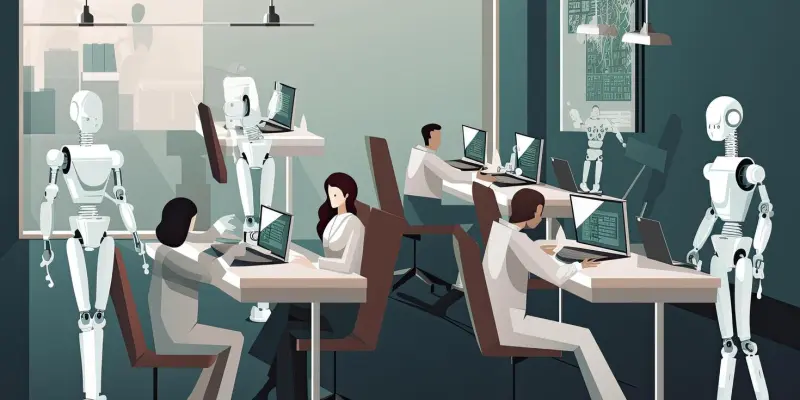As artificial intelligence continues to revolutionize various industries, there is an ever-growing concern about the impact it will have on the job market. Intelligent systems are becoming increasingly capable of performing tasks that were once exclusive to human labor, leading to fears of widespread job displacement. In this landscape, it becomes paramount for individuals to adapt and evolve to ensure their professional relevance. This article delves into strategies and mindsets that can help safeguard your job in the era of AI, emphasizing continuous learning, skill diversification, and the adoption of a growth mindset.
The Importance of Continuous Learning
Embracing Lifelong Education
One of the most effective ways to stay relevant in the job market amidst rising AI capabilities is through continuous learning. As AI systems become more sophisticated, jobs are being transformed and new roles are emerging that demand a higher level of technological proficiency. According to a McKinsey report, up to 375 million jobs could be automated by 2030, highlighting the urgency for workers to adapt. A commitment to lifelong education allows individuals to stay current with technological advancements and retain their edge in an increasingly competitive job market.
Incorporating digital literacy into one’s skillset is vital. The importance of understanding and working with new software systems, programming, data analysis, and other technological skills cannot be overstated. As industries move toward automation, those who can bridge the gap between traditional practices and AI-driven technologies will find themselves in high demand. Moreover, furthering one’s education isn’t limited to tech skills alone. Pursuing courses or certifications that enhance strategic thinking, leadership abilities, or specialized industry knowledge can be equally valuable. AI might be effective at handling data-driven tasks, but human qualities such as creativity, empathy, and strategic foresight remain irreplaceable.
Leveraging Online Educational Platforms
In the modern world, continuous learning has been made more accessible than ever, thanks to online educational platforms. Websites like Coursera, Udacity, and edX provide a plethora of courses that cover a wide range of subjects, from basic coding to advanced machine learning. These platforms offer the flexibility to learn at one’s own pace while managing other professional commitments. A LinkedIn survey highlighted that 92% of companies prioritize soft skills such as problem-solving, adaptability, and collaboration. Online courses often include modules on these soft skills, benefiting those looking to enhance their interpersonal and managerial capabilities.
Furthermore, these platforms frequently collaborate with esteemed universities and industry leaders, ensuring that the curriculum is up-to-date and relevant. By engaging with these learning resources, individuals can gain a competitive advantage in the job market. Certifications from these courses also serve as a testament to one’s dedication to personal and professional growth, making them more attractive to potential employers. The key is to remain proactive in identifying and closing skill gaps, thus staying ahead of the curve in an ever-evolving landscape.
Building a Diverse Skill Set
Integrating Multi-Disciplinary Knowledge
Another crucial strategy to safeguard your job amidst the AI revolution is to develop a diverse skill set through multi-disciplinary knowledge integration. In an era where technology and industry requirements are constantly evolving, having expertise in more than one discipline can significantly enhance your employability. Professionals combining knowledge from different fields, such as healthcare and AI, can become pivotal players in emerging sectors like medical technology. Merging skills from diverse domains allows one to draw from a broader perspective, thereby fostering innovation and addressing complex challenges that single-discipline professionals might struggle with.
The most successful professionals of the future will be those who can leverage skills across various fields to provide solutions that are both innovative and practical. For instance, a marketing professional adept in data analytics can harness AI tools to drive more targeted campaigns, while a finance expert skilled in machine learning can develop predictive models to anticipate market trends. The convergence of domain-specific knowledge and technological expertise will be the cornerstone of career progression in the age of AI. It not only boosts one’s adaptability but also opens new career avenues that were previously uncharted.
Adopting a Growth Mindset
As artificial intelligence continues to revolutionize numerous industries, concerns about its impact on the job market are growing. Increasingly sophisticated AI systems are now performing tasks previously exclusive to human workers, sparking fears of widespread job displacement. In this evolving landscape, it is crucial for individuals to adapt and evolve to remain professionally relevant. This article examines strategies and mindsets to help secure your job in the age of AI. It emphasizes the importance of continuous learning, acquiring diverse skills, and maintaining a growth mindset. By constantly updating your knowledge and adapting to new technologies, you can stay ahead in your career. Embracing a growth mindset means viewing challenges as opportunities for development, rather than threats. Diversifying your skill set makes you more adaptable and valuable in a rapidly changing job market. In summary, to safeguard your career amid the rise of AI, focus on lifelong learning, skill diversification, and cultivating a positive attitude toward growth and change.

